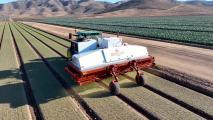
The Digital Frontier
Advancements in 20th century medicine reshaped society and made good health an expectation, not an exception. Now, 21st century breakthroughs may end disease, reverse aging, and restore sight and hearing — perhaps sooner than we think.
More
Series|
Hard Reset
The future of high energy density batteries
Picture an entire city charged by batteries. This new battery design may unlock a new era of energy.
Svante Pääbo wins Nobel Prize for discovering an extinct human species via DNA
Swedish geneticist Svante Pääbo has won the Nobel Prize for “discoveries concerning the genomes of extinct hominins and human evolution.”
Meanwhile, Antarctica’s snow is turning green
On the Antarctic Peninsula, so-called snow algae are turning the snow green, which could lay the groundwork for a whole new ecosystem.
Farming robot kills 200,000 weeds per hour with lasers
Carbon Robotics’ LaserWeeder is a smart farming robot that identifies weeds and then kills them using high-power lasers.
How Dubai is building roads in the sky
The Jestons taught us to dream of futuristic cities. Now, Dubai is building one.
New VR app lets you step inside your smartphone videos
Early-stage startup Wist Labs is developing a VR app that converts smartphone clips into 3D videos users can step inside.
Space junk created the world’s largest dump. Here’s how we can fix it.
From “laser brooms” to massive nets, space organizations have proposed many ways to clean up the mess of space debris.
Why does nature create patterns?
A physicist explains the molecular-level processes behind crystals, stripes, and basalt columns in nature.
New vaccine prevents 94% of severe RSV cases
UK drugmaker GSK’s RSV vaccine was nearly 95% effective at preventing severe infection in a phase 3 trial of older adults.
AI is able to spot diseases before symptoms appear
New AI tools are helping doctors screen healthy patients for diseases early, when treatments are most effective.
Startup builds “inflatable” concrete houses in just hours
Automatic Construction can erect a concrete house in less than two hours thanks to a new technique involving inflatable fabric molds.
As Ebola reaches Ugandan capital, vaccines race to catch up
Caused by the Sudan strain of Ebola, current vaccines and therapies approved for Ebola won’t work in Uganda. But these might.
UK scientists solve a decades-long blood mystery
Researchers have discovered a new blood group which may have been behind the tragic loss of two babies.
First-of-its-kind rocket engine nears first flight test
To build the world’s first fully reusable rocket, startup Stoke Space is completely reimagining what a rocket engine should look like.
New process could make plastic recycling more profitable
A new process that combines chemical recycling with engineered bacteria could make plastic recycling more profitable.
Male birth control options are in development, but a number of barriers still stand in the way
A survey of over 9,000 men in nine countries found that over 55% would be willing to use a new method of male birth control.
New MIT system could cool buildings up to 10℃— without electricity
MIT’s new “passive cooling” system could break the spiral of more air conditioning.
Like genes, your gut microbes pass from one generation to the next
Not only did microbes diversify with their early modern human hosts as they traveled across the globe, they followed human evolution.
Meta unveils new VR headset for work in the metaverse
Connect 2022 brought Meta’s vision of the future of work into sharper focus, with the reveal of a new headset, a major partnership, and more.
Stanford engineers warn that electric car charging could crash a grid powered by renewable energy
Most electric car charging is done at night. A grid powered mostly by renewable energy might not be able to meet demand.
Subscribe to the newsletter






















